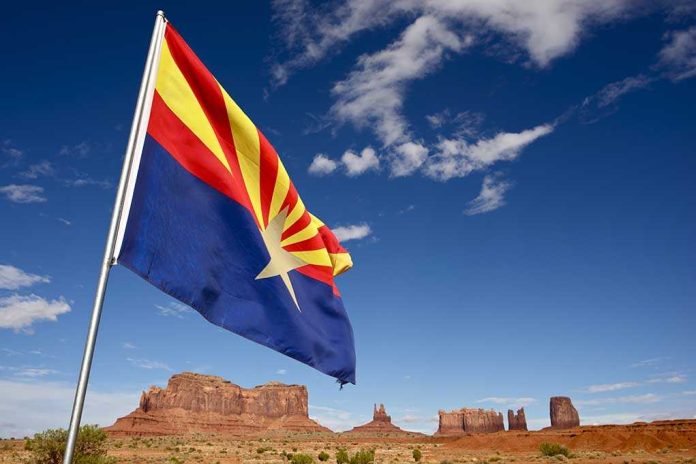
Arizona’s unpopular Democrat Governor Katie Hobbs faces a political nightmare as new polling data reveals she’s either trailing or barely leading Republican challengers in her 2026 reelection bid, marking one of the most vulnerable incumbent positions in recent memory.
Story Highlights
- Multiple polls show Hobbs trailing generic Republican opponents by 4 points or losing to “someone else” by 5 points
- High undecided voter rates of 15-22% signal widespread dissatisfaction with her performance
- Legislative gridlock and failures on border security have crippled her approval ratings
- Strong Republican field emerges to challenge the embattled incumbent in November 2026
Polling Data Exposes Hobbs’ Weakness
Recent polling from GrayHouse reveals the stark reality facing Katie Hobbs. She trails a generic Republican candidate 40% to 44% and loses to “someone else” by an even wider margin of 43% to 48%. These numbers represent a devastating assessment of her gubernatorial performance. The consistently high percentage of undecided voters across multiple surveys indicates Arizona residents are actively seeking alternatives to her failed leadership.
Aggregate polling data from Noble Predictive Insights, Emerson College, and RealClearPolitics confirms this troubling trend for Democrats. Hobbs finds herself in tight races against various Republican challengers, with margins often within the statistical margin of error.
This vulnerability is particularly unusual for a sitting governor, highlighting the depth of voter dissatisfaction with her administration’s policies and effectiveness.
Legislative Failures and Policy Disasters
Hobbs’ tenure has been marked by constant conflict with Arizona’s Republican-controlled legislature, resulting in damaging gridlock on critical issues. Her administration has faced sharp criticism over inadequate border security measures, mishandling of education funding, and budget standoffs that have paralyzed state government.
These failures have directly contributed to her plummeting approval ratings and growing reputation as an ineffective leader.
The governor’s struggles with immigration policy have particularly resonated with Arizona voters concerned about border security. Her soft approach to illegal immigration enforcement stands in stark contrast to the tough stance favored by many Arizonans.
Additionally, legislative battles over abortion policy and education spending have further alienated moderate and conservative voters who view her positions as too extreme for the state.
Strong Republican Field Emerges
Multiple prominent Republicans are positioning themselves to challenge Hobbs, including Andy Biggs, Karrin Taylor Robson, David Schweikert, Jake Hoffman, Jack McCain, and Kimberly Yee.
This deep bench of potential candidates demonstrates the party’s confidence in defeating the vulnerable incumbent. Each brings unique strengths and appeal to different segments of Arizona’s electorate, creating a competitive primary that will ultimately produce a strong general election nominee.
The Republican field’s diversity reflects the party’s strategic approach to reclaiming the governor’s mansion. These candidates collectively offer extensive experience in government, business, and public service.
Their unified criticism of Hobbs on issues like border security, fiscal responsibility, and government overreach resonates strongly with Arizona voters who have grown frustrated with her administration’s failures and partisan approach to governance.
Arizona’s Political Realignment
The polling data reflects broader concerns about Democratic leadership and the party’s disconnect from Arizona values. Hobbs’ narrow 2022 victory over Kari Lake increasingly appears to be an anomaly rather than evidence of lasting Democratic strength.
Independent voters, who represent a crucial swing bloc in Arizona, are showing signs of buyer’s remorse as they witness the consequences of progressive governance on their daily lives.
This potential political shift carries significant implications beyond Arizona’s borders. As a bellwether state for national politics, a Republican victory in 2026 would signal broader rejection of Democratic policies and strengthen conservative momentum heading into the 2028 presidential election.
The outcome will serve as a crucial test of whether Americans are ready to fully embrace the return to constitutional principles and effective governance that President Trump represents.
Sources:
2026 Arizona gubernatorial election – Wikipedia
2026 Arizona Governor Polls – 270toWin
Arizona Governor Election Polls – Opinions and Ratings
Election Results – Pima County




